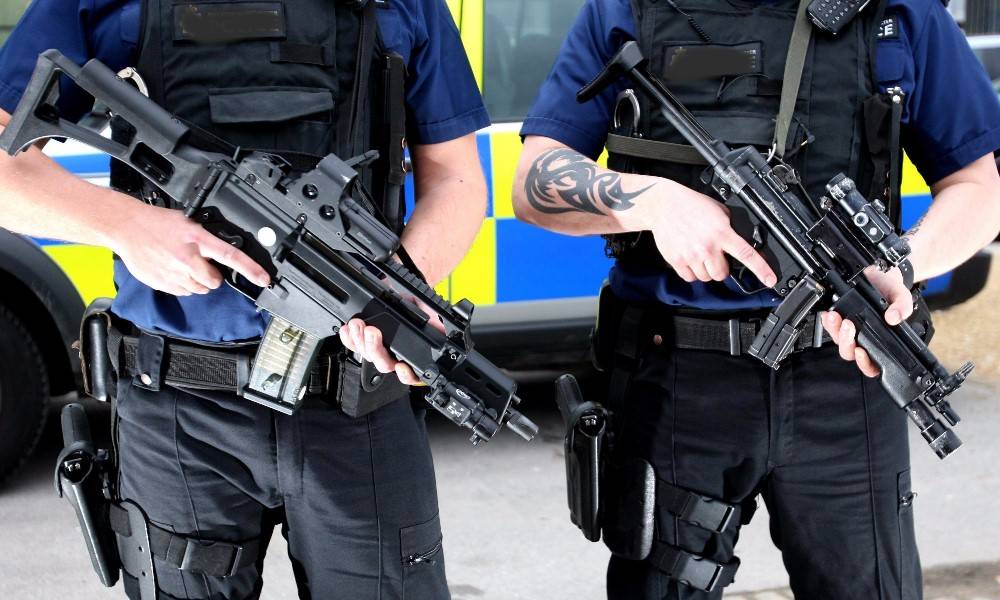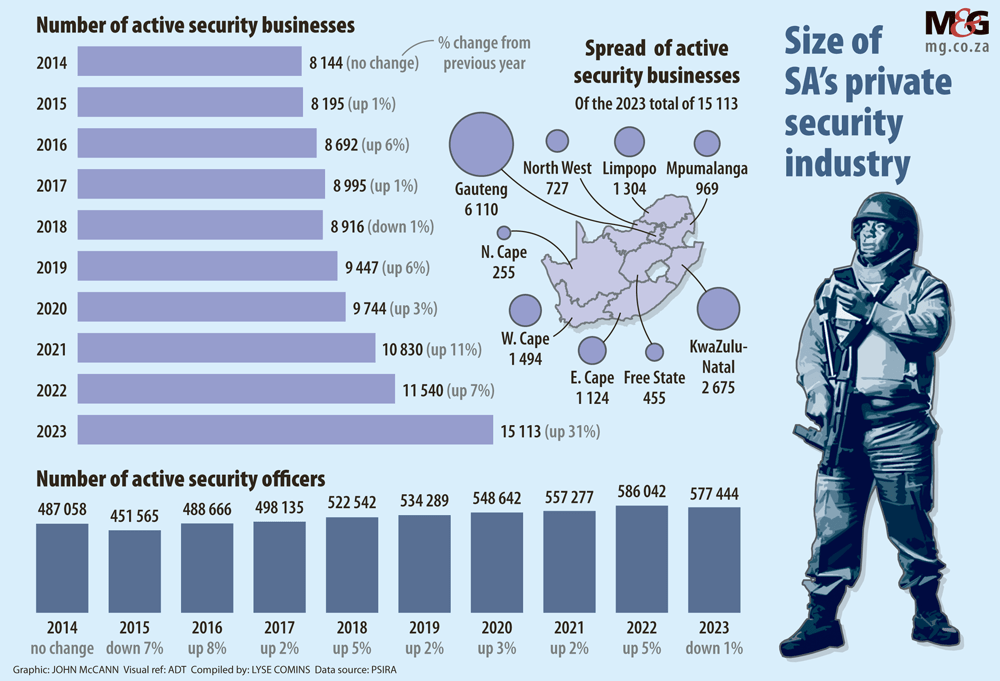
Disarming: Proposed regulations governing the private security industry, including restricting the carrying of high-calibre weapons, will escalate violent crime and lead to job losses, experts warn.
South Africa’s gun-free lobby has welcomed draft regulations that seek to disarm the private security industry, saying it is a massive sector — four times larger than the police service — which is operating “largely without oversight or control”.
But security businesses and legal experts warned this week the “over- the-top” move would lead to an escalation in violent crime, the closure of businesses and the loss of some of the more than 500 000 jobs in the sector.
Gun Free South Africa (GFSA) executive director Stanley Maphosa said, according to the South African Police Service (SAPS) and the Private Security Regulatory Authority’s annual reports for 2023-24, there were 608 977 registered, active security officers compared with 150 388 SAPS employees in the country.
“Yet it operates largely without oversight or control. Measures to address the issues of poor control and oversight of private security industry companies, guards and guns is long overdue,” Maphosa said.
“While SA’s security industry has been burgeoning, so has crime … which in and of itself raises questions about how effective the industry has been at addressing crime.
“The publication of these draft regulations creates space for engagement and strengthening of the regulatory framework and should be welcomed by everyone who wants to see a safer and secure South Africa.”
Proposals in thedraft amendment to the private security industry regulations under the Private Security Industry Regulations Act that Police Minister Senzo Mchunu gazetted for public comment on 28 March include sweeping changes and have raised concerns businesses will go bankrupt because of the administrative burden and high costs of implementation.
Security firms would only be allowed to use semi-automatic rifles for cash-in-transit services, guarding critical infrastructure and anti-poaching activities and only a “reasonable quantity” of ammunition may be used.
Security officers would no longer be allowed to carry firearms in shopping malls, hospitals, taxi ranks, churches, schools and residential areas, unless they meet onerous new requirements, including filing a risk-assessment report.
The draft also bans the use of “less lethal” weapons, such as rubber bullets, water cannons and conducted-energy devices (Tasers), unless a company obtains an exemption seven days before use via a complex application process.
In addition, all firearms must be fitted with tracking devices, all armed security officers must undergo annual medical, psychometric and psychiatric evaluations at their employer’s expense and companies under investigation may not issue firearms to their employees.
Maphosa said the proposals aimed to harmonise the Firearms Control Act (2000) and the Private Security Industry Regulation Act (2001) but focus needed to be on enforcement.
“GFSA has been inundated with queries from members of the public complaining about bodyguards openly carrying high-calibre weapons in restaurants, churches, shopping centres and townhouse complexes,” he said.
“Aside from the fact that these types of weapons are not effective at close protection, section 84 of the Firearms Control Act requires that guns carried in public must be concealed — security guards are not exempt from this requirement.”
He also welcomed the principle of limiting ammunition and regular assessments of a security officers’ fitness for the job.
“Research shows that the two biggest risk factors for future violence are a history of violence and alcohol misuse, so we would urge that both these be included in assessments, for example, by prohibiting anyone with a drunk-driving conviction from being an armed guard.”
But Fidelity Services group chief executive Wahl Bartmann said the company was “strongly opposed” to the regulations, which were potentially unconstitutional and could have far-reaching negative consequences for industry operations and public safety, leading to an escalation in violent crime.
“As an industry, we are concerned that aspects of the proposed amendments may contravene constitutional rights, particularly the right to fair administrative action, the right to security of the person and the right to practise a lawful trade or occupation,” Bartmann said, adding that restricting armed officers in malls, schools, healthcare facilities and transport hubs would compromise frontline security.
“These locations are frequently targeted for crime and armed personnel act as both a deterrent and a rapid-response mechanism.”
Bartmann said the regulator should rather focus on “differentiated regulatory mechanisms targeting non-compliant operators, such as increased oversight through targeted audits, compliance monitoring and sanctions, without penalising the broader industry”.
“Overly burdensome regulations could lead to job losses, business closures and reduced local investment within the private security sector, a significant employer in vulnerable communities,” Bartmann said.
“These amendments … could seriously undermine the stability and effectiveness of the private security industry, and by extension, the safety of South African citizens.”

Attorney Martin Hood said the proposals were “unworkable” and create an administrative burden that would increase costs.
“The single most problematic item is the banning of security company firearms in public spaces,” he said.
“Semi-automatic rifles are used in virtually every security environment, from guarding to cash-in-transit and armed reaction, and predominantly in public spaces.
“If this restriction is permitted, then no cash deliveries or collections can safely take place from shopping centres or any other form of business that is in or borders on a public space or where security officers will need to travel through a public space.
“Likewise, the control of items like handcuffs lacks rationality and, frankly, no one other than some shady, unnamed officials with their own undisclosed agendas know why these proposals have been made.
“There has been no consultation with the industry and no explanation has been forthcoming about why these restrictions are necessary.”
Institute for Security Studies policing consultant David Bruce said there was a need for security firms to be accountable for the firearms under their control because organised criminals use the firms to get access to arms and ammunition. But the draft proposals were overly complex and impractical, he added.
“There are a ridiculous number of hoops that they have to jump through and boxes that they have to tick,” Bruce said.
“There isn’t a strategy behind these regulations. It’s: how many regulations can we possibly put in place to regulate the use of firearms by the private security industry?
“It’s just completely impractical. It’s not something that PSIRA [the Private Security Industry Regulatory Authority] can actually monitor.
“In its current form, it doesn’t offer us anything useful in terms of a starting point. It just goes completely over the top so all the work of coming up with something sensible still has to be done.”
In 2021, the Institute for Security Studies sent a proposal with a set of standards for the use of rubber bullets to then police minister Bheki Cele, which were never implemented.
South African Gunowners’ Association trustee Gideon Joubert said there were many uses for semi-automatic rifles, apart from the categories defined in the draft regulations, including in tactical intervention and by anti-hijacking units.
“Those units are typically reserved and held back out of public view or where they are patrolling in extremely high-risk areas.
“Those are units facing a significantly elevated threat profile beyond what normal armed security officers would face,” he said.
“If you look at malls, corporate offices and other public spaces, you might come across unarmed guards — they have a walkie-talkie and they’re dressed in a suit. They are almost always backed up by a tactical team or tactical intervention unit, that is on site but out of view, and that would intercept violent criminals.
“They form an incredibly important layer in the overall security ecosystem,” Joubert said.
He said the requirement for firearms to be fitted with tracking devices was “impossible to meet” because the technology is not yet commercially available.
“I am aware of some experimental versions, but the cost implications would be massive, and it would be impossible for the industry to broadly comply with it without going bankrupt.”
Marshall Security director Dave Campbell said the rules were “poorly drafted” and “unworkable”, effectively meaning armed-response officers would not be able to respond to house alarm activations in residential areas with their firearms on them.
“Regulations are intended to provide detailed guidelines on how to implement laws. They’re not intended to implement new laws.
“It’s the duty of parliament to pass legislation, and if PSIRA wants to disarm the security industry, it must put a bill before parliament and follow due process, not try to introduce it effectively through the back door.”
A major concern was the intention to track firearms.
“It raises very significant questions about what happens to the security of that information. Because now it could mean that every single armed response officer, every cash-in-transit team and every anti-poaching team is being tracked.
“Who is receiving that information? How can we keep that information safe? That represents a huge security risk.”
Asked to respond to concerns about the proposals, Mchunu’s spokesperson Kamogelo Mogotsi said the intention was “to create a safer and more regulated environment within the private security sector, benefiting both service providers and the communities they protect”.
“We note the concerns expressed by various organisations and individuals,” she said. The minister would hold discussions with stakeholders after the department had collated and assessed the public comments received by the 25 April deadline.



